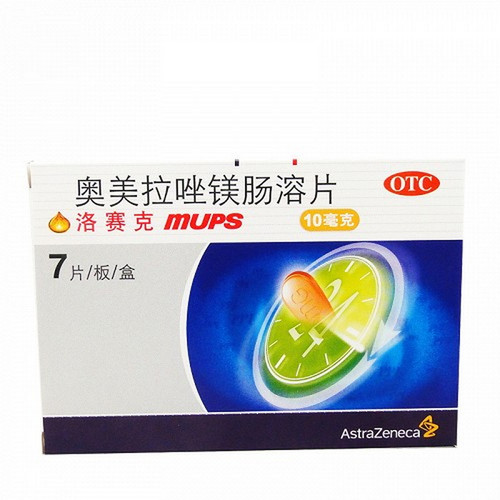Product Overview
[Drug Name]
Trade Name: Naixin
English Name: Esomeprazole Magnesium Enteric-coated Tablets
Chinese Pinyin: Alsuomeilazuomei ChangrongPian
[Ingredients]
The active ingredient of this product is esomeprazole magnesium.
[Appearance]
This product is an enteric-coated tablet. The 20mg tablet is light pink, and the 40mg tablet is pink. Both are oblong, biconvex tablets.
[Indications]
1. Gastroesophageal reflux disease (GERD). 2. Treatment of erosive reflux esophagitis. 3. Long-term maintenance treatment to prevent recurrence in patients with resolved esophagitis. 4. Symptomatic control of gastroesophageal reflux disease (GERD) combined with appropriate antimicrobial therapy to eradicate Helicobacter pylori. 5. Healing of duodenal ulcers associated with H. pylori infection. 6. Prevention of recurrence of H. pylori-related peptic ulcers.
[Dosage and Administration]
Tablets should be swallowed whole with liquid and should not be chewed or crushed. 1. For the treatment of erosive reflux esophagitis, take 40 mg once daily for four weeks. 2. For patients with unresolved esophagitis or persistent symptoms, an additional four weeks of treatment is recommended. For long-term maintenance treatment to prevent relapse in patients with resolved esophagitis, take 20 mg once daily. 3. For symptom control of gastroesophageal reflux disease (GERD): For patients without esophagitis, take 20 mg once daily. If symptoms are not controlled after four weeks, the patient should undergo further evaluation. Once symptoms resolve, subsequent symptom control can be achieved with immediate therapy, i.e., 20 mg orally once daily as needed. 4. For combination therapy with appropriate antimicrobial therapy to eradicate Helicobacter pylori, heal Helicobacter pylori-associated duodenal ulcers, and prevent recurrence of Helicobacter pylori-associated peptic ulcers: Esomeprazole magnesium enteric-coated tablets 20 mg + amoxicillin 1 g + clarithromycin 500 mg twice daily for seven days.
[Adverse Reactions]
The following adverse reactions have been identified or suspected in clinical trials of esomeprazole; none of these reactions are dose-related. The following adverse reactions have been observed with the racemate (omeprazole) and may also occur with esomeprazole. 1. Central and Peripheral Nervous System: Paresthesias, somnolence, insomnia, and dizziness. Reversible confusion, agitation, aggression, depression, and hallucinations, primarily in patients with severe disease. 2. Endocrine: Gynecomastia. 3. Gastrointestinal: Stomatitis and gastrointestinal candidiasis. 4. Hematologic: Leukopenia, thrombocytopenia, agranulocytosis, and pancytopenia. 5. Hepatic: Encephalopathy (in patients with preexisting severe liver disease); icteric or non-icteric hepatitis; and liver failure. 6. Musculoskeletal: Arthralgias, muscle weakness, and myalgias. 7. Skin: Rash, photosensitivity, erythema multiforme, Stevens-Johnson syndrome, toxic epithelial necrosis, and alopecia. 8. Other: Malaise. Hypersensitivity reactions, such as fever, bronchospasm, and interstitial nephritis. Hyperhidrosis, peripheral edema, blurred vision, dysosmia, and hyponatremia.
[Contraindications]
This product is contraindicated in patients with known hypersensitivity to esomeprazole, other benzimidazole compounds, or any other component of this product.
[Precautions]
1. If any alarm symptoms (such as significant, unintentional weight loss, recurrent vomiting, dysphagia, hematemesis, or melena) occur and gastric ulcer is suspected or present, malignancy should be excluded, as treatment with esomeprazole magnesium enteric-coated tablets may alleviate symptoms and delay diagnosis. 2. Patients receiving long-term treatment with this drug (especially those taking it for more than one year) should be monitored regularly. 3. Patients receiving on-demand therapy should be advised to contact their physician if their symptoms change. When using on-demand therapy, the potential for drug interactions due to fluctuations in esomeprazole blood concentrations should be considered (see [Drug Interactions]). 4. When esomeprazole is used for Helicobacter pylori eradication, potential drug interactions with all components of triple therapy should be considered. Clarithromycin is a potent inhibitor of CYP3A4. Therefore, when patients taking triple therapy are concurrently taking other drugs metabolized by CYP3A4, such as cisapride, contraindications and interactions with clarithromycin should be considered. 5. Patients with rare genetic disorders such as fructose intolerance, glucose-galactose malabsorption, or sucrase-isomaltase deficiency should not take this drug. 6. Renal Impairment: No dose adjustment is required in patients with renal impairment. Caution should be exercised in patients with severe renal impairment, as experience with this drug is limited (see [Pharmacokinetics]). 7. Hepatic Impairment: No dose adjustment is required in patients with mild to moderate hepatic impairment. For patients with severe hepatic impairment, the dose of esomeprazole magnesium enteric-coated tablets should not exceed 20 mg (see [Pharmacokinetics]). 8. Effects on the ability to drive and use machines: No such effects have been observed.
[Use in Special Populations]
Precautions for children: This drug should not be used in children. Pregnancy and Lactation Precautions: Use with caution in pregnant women. Not for use in lactating women.
Elderly Precautions: No dose adjustment is required for elderly patients.
[Drug Interactions]
The absorption of ketoconazole and itraconazole is reduced during esomeprazole treatment. When coadministered with diazepam, citalopram, imipramine, clomipramine, phenytoin, and other medications, the dose of these drugs may require a reduction. Therefore, during phenytoin treatment, monitoring of phenytoin plasma concentrations is recommended when esomeprazole is coadministered or discontinued. There are no incompatibilities.
[Pharmacology]
Based on routine repeated-dose toxicity, genotoxicity, and reproductive toxicity studies, preclinical studies have not demonstrated a specific hazard for esomeprazole in humans. Carcinogenicity studies using the racemic mixture in rats revealed gastric ECL cell proliferation and carcinoid tumors. These gastric effects in rats are due to persistent, significant hypergastrinemia, secondary to decreased gastric acid production, as seen in rats after long-term use of gastric acid secretion inhibitors.
[Storage]
Sealed, store below 30°C
[Specifications]
20mg x 7 tablets
[Packaging]
Box
[Expiration Date]
36 months
[Approval Number]
National Medical Products Approval No. H20046379
[Manufacturer]
AstraZeneca Pharmaceuticals Ltd.








